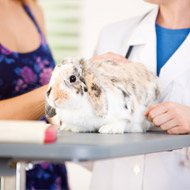Rabbit collective launch webinars on preventative healthcare

The webinars have been designed to be accessible and engaging to all vets and nurses, regardless of experience.
The veterinary profession is being urged to watch a new webinar series focussing on rabbit healthcare.
Filmed by the Rabbit Awareness Week (RAW) Collective, the three-part series has been launched ahead of this year’s RAW Protect and Prevent Campaign (1-9 June). The three webinars are 20 minutes in length and cover diet; neutering and sudden death; infectious diseases and prevention, including vaccination.
RAW veterinary advisor and webinar host Dr Richard Saunders said: “These webinars provide information across all of the key areas relating to preventative healthcare in rabbits. There is a large number of health issues facing rabbits but thankfully many of these can be prevented.
“Vets play an incredibly important role in ensuring rabbit owners have all the information they need to correctly care for their pets but unfortunately there is still a lack of awareness and understanding around many basic needs such as diet, husbandry and the importance of vaccinations to protect against dangerous diseases.
“The webinars have been designed to be accessible and engaging to all vets and nurses, regardless of their experience level. We’re urging vets and nurses to watch all three seminars so they’re able to provide the best possible advice to rabbit owners seeking advice on their pets in advance of Rabbit Awareness Week.”
Thousands of veterinary practices across the UK and Ireland participate in Rabbit Awareness Week every year. This years’ theme of ‘Protect and Prevent’ aims to raise awareness about the importance of vaccinations, following the continued outbreak of rabbit viral haemorrhagic disease 2 (RVHD2).
To watch the webinars and learn more about this year’s RAW campaign visit www.rabbitawarenessweek.co.uk



 The Veterinary Medicines Directorate (VMD) is inviting applications from veterinary students to attend a one-week extramural studies (EMS) placement in July 2026.
The Veterinary Medicines Directorate (VMD) is inviting applications from veterinary students to attend a one-week extramural studies (EMS) placement in July 2026.